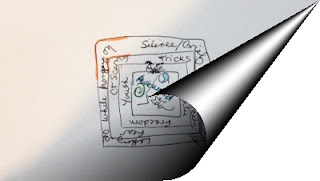What do you read? Does it tie into what you write? Do you love to ski, quilt or garden?
In considering your passionate commitment to any hobby, don't count writing itself, for now. Do, however, consider the articles, videos and audios that feed a creative need to express yourself in knitting, sewing, painting, fixing your home or creating the perfect souffle. Books we read over and over again for the sheer pleasure and the other hobbies that many creative people take on can make us more open to new ideas.
We can find our greatest inspiration to write in the day-to-day passions we explore without questioning whether we are good enough to do them. In the click of needles, pressing a peddle and the smell of grease paint, we learn or learned to appreciate colors, the feel of fabric or yarn and the end product.
Unlike writing, which we seldom celebrate for the word by word play of meaning and rhythms, most of us still appreciate the neck scarf with its dropped stitches and the lopsided pot we threw as the triumphs they represent.
I read and hear too many people say that writing is somehow painful, which begs the question of why they would write in the first place. If you hear yourself saying this to another person, try rephrasing your self-talk in terms of the passion that writing brings out. Also, stop worrying so much about that end product and enjoy the journey.

